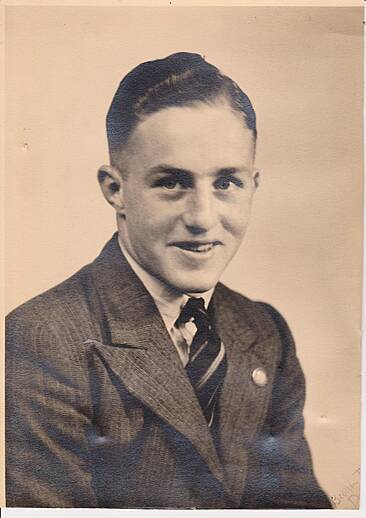Derry Sweeney, class '36
In Memoriam

-
HE was a pint sized "scut" full of life and vitality. He had a roguish eye that made you suspect he was either before or after some devilment, and you were nearly always right. I was a "big" fellow two or three years his senior but in some sort of way I wished I were like him—call it inverted hero worship because kids tend to look up not down. His name was Derry Sweeney.
My memory of him goes back to 1929 when he came to Castleknock as a small boy—a very small boy he was—and a small boy he remained till the end in the sense that he retained the attractive and boyish traits of youth, gay and outwardly carefree, infectiously happy. However, he was a little demon on the football field. He always wore togs that appeared twice too big for him and he was always in the thick of things doing a man's job all the time. I recall, in particular, how sometimes forwards were piled on the ground in a huge mass with no ball visible. No matter who went down with the ball, always from the middle of the pile Derry emerged with it and you saw the little figure, toes turned in with the ball going hell for leather for the line.
Another memory is that his pals in school were not all drawn from the most law-abiding. John Joe Cussen and himself were inseparables and John Joe was all but a six footer even as a schoolboy: Mutt and Jeff in real life. Their schoolboy escapades were many and colourful, not always, it need be added, meeting with the wholehearted approval of the Dean. But all of them delightful pranks of schoolboys that broke the monotony of life's routine. His school pals were pals for life. He was almost as closely linked with John Joe's romances as J.J. himself. A strange Providence brought him to New York a few weeks before he died where he met with another buddy, Bill Dallas.
As I said he was my junior by a couple of years and we did not meet again until the Rock, and that only for a short period, but long enough to see how he had developed. His academic ability was not great, but he had good ability. His real ability was in another direction, and that talent he used to the full.
As a boy he went to school in Mount Sackville where he learned the sign language. I remember he was the only one of us who could communicate with the deaf girls who were in charge of the domestic arrangements. After ordination, he came to Phibsboro where he was a "natural" to replace Father "Daddy" Nolan with the deaf, and so began his life's apostolate.
He had a Donegal pronunciation of deaf which sounded like "dayf" (he was himself Donegalissmus). When he said it you could sense the affection he had for them and his passionate interest in their welfare. He was a small man, he walked with short, mincing steps and always left you with the impression he was in a hurry, and indeed so he was. He reminded me of Zachaus running ahead of the crowd, climbing the sycamore tree to catch a glimpse of Christ. Derry resembled Zachaus in more than stature; he too caught a glimpse of Christ; he saw His face and saw it especially in the face of the deaf men and women for whom he worked. He never wronged anyone but like Zachaus he gave half and more than half of what he had in time and talents to them. Since I came to Phibsboro twelve months ago, he was never home before 11.30 p.m. and I mean always— seven nights of the week—in the deaf Club in Rathmines. During the day he was in the deaf schools or chasing some of them all over town to help some deaf person, getting work, hearing confessions etc. Small wonder they loved him so much.
When you were talking to him you could not but notice his eyes. They were dancing eyes, a combination of bewilderment and wonder—the eyes of a child. He always had a smile on his face and no wonder he had friends everywhere he went, and these were mostly among the under-privileged. I remember at Christmas his reading me a letter from Scotland, from a friend there. The friend was an inmate of a Criminal Mental Asylum whom he used to take out for a day every so often when he was in Scotland. Derry was at his wit's end to see how he could do the same for him last Christmas—"I'm the only friend he has". That was characteristic.
How we miss him in community. In the Common Room after dinner the day he died, we were joking him about how hard he was on his assistant, Fr. John Cleary. As usual, Derry just threw back his head and laughed. On his way to the Clarence Hotel he drove me to the Slater Hospital to visit a confrere, and Father Dick McCullen to Jervis Street to visit his brother. We talked and joked on the way, and my last memory is of the smiling face under the hat he always wore at a jaunty angle.
To his relations we offer our deep and sincere sympathy.
